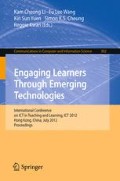Abstract
Program debugging is a complex cognitive process. Since it is an important step in programming, debug training not only improves learner’s programming capacity, but also their problem solving capacity. For the purpose of this paper, three C language experts were invited; novices were represented by three third-year students. All six persons participated in a think-aloud experiment, where every person was given two programs to debug; each program was set up to contain three error types, i.e. syntax, semantic and logic.
The results showed that experts have a better grasp of feedback from the compiler. On the other hand, experts and novices have similar thinking process in syntax debugging. In semantic debugging, experts are able to comprehend the output results, but novices are rather confused; as to logic debugging, novices are less developed in logical structuring. This paper suggests student’s debugging capacity must be reinforced in programming courses, particularly in semantic and logic debugging.
Access this chapter
Tax calculation will be finalised at checkout
Purchases are for personal use only
Preview
Unable to display preview. Download preview PDF.
References
Allwood, C.M., Bjorhag, C.G.: Novice’s debugging when programming in Pascal. International Journal of Man-Machine Studies 33, 707–724 (1990)
Bellows, P.: High-visibility debug-by-design for FPGA platforms. Journal of Supercomputing 32(2), 105–118 (2005)
Bisant, D.B., Groninger, L.: Cognitive processes in software fault detection: a review and synthesis. International Journal of Human-Computer Interaction 5(2), 189–206 (1993)
Brooks, R.: Towards a theory of the comprehension of computer program. International Journal of Man-Machine Studies 18(6), 543–554 (1983)
Carver, S.M., Klahr, D.: Assessing children’s LOGO debugging skills with a formal model. Journal of Educational Computing Research 2(4), 487–525 (1986)
Carver, S.M., Risinger, S.C.: Improving children’s debugging skills. In: Empirical Studies of Programmer: Second Workshop, pp. 147–171. Ablex, Norwood (1987)
Gill, R.: VBA programming for Microsoft Office project, versions 98 through 2007. SciTech Book News 31(3) (2007)
Gilmore, D.J.: Models of debugging. Acta Psychologica 78, 151–172 (1991)
Goering, R.: Multicore design strives for balance: but programming, debug tools complicate adoption. Electronic Engineering Times 1416, 1–74 (2006)
Gould, J.D.: Some psychological evidence on how people debug computer program. International Journal of Man-Machine Studies 7(1), 151–181 (1975)
Katz, I.R., Anderson, J.R.: Debugging: an analysis of bug-location strategies. Human-Computer Interaction 3, 351–399 (1988)
Ko, A.J., Myers, B.A.: Development and evaluation of a model of programming errors. In: Proceedings of IEEE Symposia on Human-Centric Computing Languages and Environments, pp. 7–14 (2003)
Krutetskii, V.A.: The psychology of mathematical abilities in school children. The University of Chicago Press, Chicago (1976)
Lammers, D.: Debugger covers every embedded pin. Electronic Engineering Times 1436, 34 (2006)
Larkin, J., Dorothea, P.S., Herbert, A.S.: Expert and Novice Performance in Solving Physics Problems. Science 208(4450), 1335–1342 (1980)
Letovsky, S.: Cognitive processes in program comprehension. Empirical Studies of Programmers, 58–79 (1986)
Letovsky, S., Soloway, E.: Delocalized plans and program comprehension. IEEE Software 19(3), 41–48 (1986)
Mark, J.: British inventors develop chip debugging method. US Fed News Service, Including US State News. Washington, D.C. (2007)
Maria, S.: Competencies and tips for effective leadership: from novice to expert. Journal of Nursing Administration 37(4), 167–170 (2007)
Miller, L.A.: Programming by non-programmers. International Journal of Man-Machine Studies 6, 237–260 (1974)
Mutschler, A.S.: Ambric aims for massively-parallel programming. Electronic News 52(42), 21 (2006)
Nanja, M., Cook, C.R.: An analysis of the on-line debugging process. In: Empirical Studies of Programmers: Second Workshop, pp. 172–184 (1987)
Newell, A.J., Simon, H.A.: Human problem solving. Prentice-Hall, Englewood Cliffs (1972)
Patterson, D.A.: Reflections on a programming olympiad. Communications of the ACM 48(7), 15–16 (2005)
Rezel, E.S.: The effect of training subjects in self-explanation strategies on problem solving success in computer programming. Abstract retrieved from ProQuest-Dissertation, AAI3093148 (2003)
Ruthruff, J.R., Prabhakararao, S., Reichwein, J., Cook, C., Creswick, E., Burnett, M.: Interactive, visual fault localization support for end-user programmers. Journal of Visual Languages & Computing 16(1/2), 3–40 (2005)
Singh, C.: Student understanding of symmetry and Gauss’s law of electricity. American Journal of Physics 74(10), 923–936 (2006)
Tsau, S.R.: College students’ diagnostic capabilities in computer programming. Abstract retrieved from ProQuest-Dissertation, AAI9636605 (1996)
Vessey, I.: Expertise in debugging computer program: an analysis of the content of verbal protocols. IEEE Transactions on System, Man and Cybernetics 16(5), 621–638 (1986)
Vessey, I.: Expertise in debugging computer programs. International Journal of Man-Machine Studies 18, 459–494 (1983)
Wiedenbeck, S.: Novice/expert differences in programming skills. International Journal of Man-Machine Studies 23, 383–390 (1985)
Xu, S.: Cognitive aspects of software engineering processes. Abstract retrieved from ProQuest-Dissertation, AAI3210999 (2006)
Uchina, S., Monden, A., Linda, H., Matsumoto, K., Inoue, K., Kudo, H.: Debugging process models based on changes in impressions of software modules. In: Proceedings of International Symposium on Future Software Technology, pp. 172–184 (2000)
Yoon, B., Garcia, O.N.: Cognitive activities and support in debugging. In: Proceedings of 4th Annual Symposia on Human Interaction with Complex System, pp. 160–169 (1998)
Youngs, E.A.: Human errors in programming. International Journal of Man-Machine Studies 6, 361–376 (1974)
Author information
Authors and Affiliations
Editor information
Editors and Affiliations
Rights and permissions
Copyright information
© 2012 Springer-Verlag Berlin Heidelberg
About this paper
Cite this paper
Yen, CZ., Wu, PH., Lin, CF. (2012). Analysis of Experts’ and Novices’ Thinking Process in Program Debugging. In: Li, K.C., Wang, F.L., Yuen, K.S., Cheung, S.K.S., Kwan, R. (eds) Engaging Learners Through Emerging Technologies. ICT 2012. Communications in Computer and Information Science, vol 302. Springer, Berlin, Heidelberg. https://doi.org/10.1007/978-3-642-31398-1_12
Download citation
DOI: https://doi.org/10.1007/978-3-642-31398-1_12
Publisher Name: Springer, Berlin, Heidelberg
Print ISBN: 978-3-642-31397-4
Online ISBN: 978-3-642-31398-1
eBook Packages: Computer ScienceComputer Science (R0)

